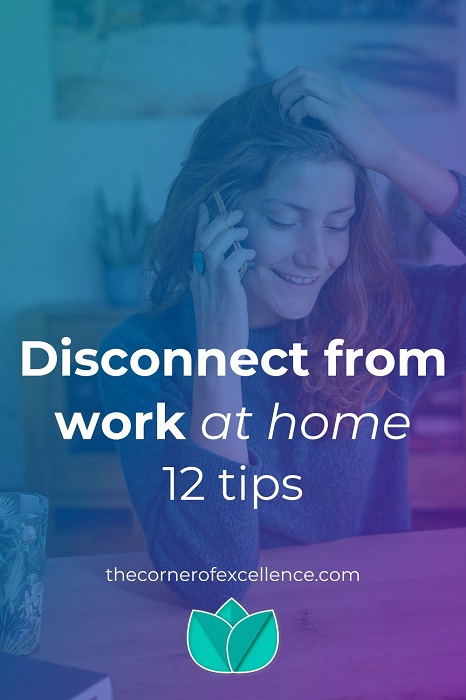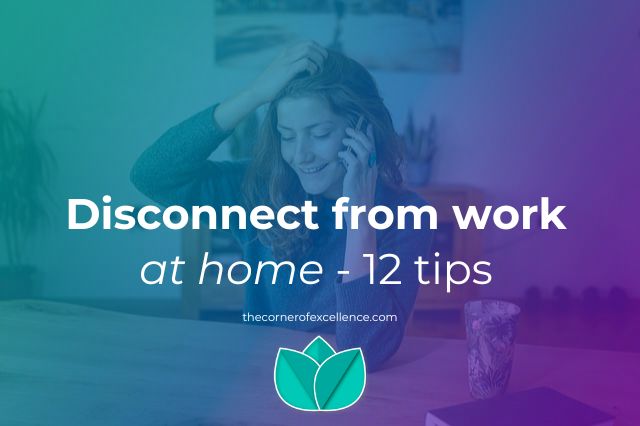When office and free-time share spaces, it can be difficult to disconnect from work. The boundaries between free time and work get blurred. But it is necessary for our health, our well-being and our productivity. Let us see why and how to disconnect from work at home.
Why disconnecting from work at home is important
When we continue brooding over work in our spare time, our mind does not recover from the work efforts. We may feel nervous or restless. We do not pay attention to the present. With this, we lose the opportunity to enjoy what we are doing in our free time.
What is more, this can lead to restless sleep. So we do not recover at night, like we should, either. We gradually accumulate fatigue, exhaustion and stress that harm our performance and productivity. What is worse is the negative effect on our well-being and our health.
How to disconnect from work at home
As I mentioned, it can be more difficult due to the fact that work and free time share spaces. But there are several tricks that will help us separate both areas and thus disconnect better from work. The key is to give self-care importance. In addition to the basic tips for disconnecting from work, here are some additional ones.
1. Stick to the working hours
First of all, it is important that you try to stick to fixed work and rest hours. In this way your body and mind get used to it and know when to work and when not to.
You may find it difficult to finish work at a certain hour because there is another matter you should attend. But remember that it is common to have more work than time available. Thus, it is key that you prioritise. That means prioritising not only your tasks but also your well-being and self-care.
In this sense, it can help you to make appointments in your free time to practice sports or meet someone. That way you force yourself to unplug at a certain hour.

2. Tidy up your workplace
When you are done working, clear your desk. Close the computer. If it is a laptop, store it away with its cables and accessories. Also collect your notebook and papers. Creating this ritual of putting order helps you mentally distance yourself from work.
3. Distance yourself from the workplace
After cleaning up, I suggest that you change locations at home. Physically distance yourself from your workplace and go to another room.
You may not have a dedicated workplace at home. In other words, the location may share other functions associated with your free time. Then it is even more important to remove yourself for a while to help you mentally distance yourself from work. So go do something in another room for a while. When you have mentally disconnected from work, you may return to that place.
4. Change clothes
If you have a hard time disconnecting from work at home, I suggest you dress in work clothes to “go to the office.” In this way, when finished, you can change into leisure-time clothes. This fact becomes another ritual that helps you mentally distance yourself from work and disconnect better.
5. Disconnect from the digital world
When working at home, we spend many more hours in front of a screen than if we were in an office. Videoconferencing meetings and getting up less from our chair add hours of screen exposure. In an office you would get up from time to time to go talk to a colleague, to have a coffee or to have a face-to-face meeting.
So when you finish work, I recommend that you do something next that does not involve looking at a screen. Choose an offline activity to rest your eyes and mind.
6. Move your body
When working from home we not only expose ourselves more to a screen, we also tend to move less. The commute to the office, eating out, or visiting another department are usually opportunities to stretch your legs.
We should move at least 20 minutes a day. In addition, physical exercise helps relieve stress and disconnect from work. That is because we focus our attention on the movements of our body. This helps us to clear our minds for a while of other matters and thoughts.
Therefore, find yourself a while or several times a day to move a little. Going for a walk, running, yoga, Pilates, or aerobics are some ideas. You can find endless exercises on the internet. So take the opportunity to vary your physical activity and try new sports exercises.
7. Stretch your body
I also suggest that you stretch several times a day. This way you keep your body flexible and release the tensions of all the hours sitting. In addition, stretching is very relaxing. Again, you may find many routines on the internet.
8. Live the present moment
Practicing mindfulness, contemplation, or meditation helps us to focus our attention on the present moment. It helps us to relativise the problems, the supposed urgencies and other thoughts that haunt our minds.
I suggest that you spend several moments a day just being. Meditate, look out the window for a while or pay full attention to some daily activity such as eating or brushing your teeth for example. You will see that it has a calming effect.

9. Have fun
Fun is the best remedy against stress and to put aside thoughts about work. So spend time on what you like. Reading, doing crosswords or crafts, gardening, playing board games with your family etc.
If you like video games, I suggest you let some time pass after finishing work. Choose a screen-free activity first before diving back into the digital world. You should also limit the time you spend playing video games. The same goes for television. They are activities that entertain us but do not allow us to relax in the same way as a non-digital activity.
10. Meet friends
I could have included friends in the fun section. But they deserve a special mention. Taking care of our personal relationships not only benefits our well-being. Spending time with friends is also one of the best remedies against “workitis”. You can talk about anything with them. You can share your concerns, let them cheer you up, cheer them up, or have a laugh. So enjoy the company of your friends, be it in person, by phone or by videoconference.
11. Put order
You may see housework as a necessary evil. But you can also take it as an opportunity to change the chip after work. Pick up a room, clean, change the sheets, put the washing machine on, dust the furniture or whatever. By the way, this is one more opportunity to move your body a little.
12. Pamper yourself
Take time to relax by pampering your body and mind. Prepare a tea or a smoothie. Then curl up on the couch with your drink and a book.
Take a relaxing bath or shower. Have a manicure or pedicure. Put on a face mask or do a peeling. Choose something that you enjoy and that allows you to nurture yourself and relax.
Bonus: Take breaks during the day
Finally, I recommend that you try to take several breaks throughout the day. As I mentioned before, when we work at home, we tend to take our eyes less off the computer and get up less to run errands. But to be productive, we need to rest our eyes and our mind from time to time.
Still, you may have a hard time taking breaks because you think you should be available at all times. In the office your bosses and colleagues would see that you got up from your desk and would only look for you if it was really urgent.
How then to signal from a distance that you are on a break, so that they do not interrupt you? Telephony and videoconferencing apps often offer the possibility of configuring that you are absent. You can also put the mobile phone for a while in silence or on airplane mode.
If it is still difficult for you, could you perhaps agree on hours with your superior and/or colleagues during which not to bother each other?
Is it difficult for you to disconnect from work at home?
How about disconnecting when you finish working from home? What do you usually do to manage? If you find it difficult, which of these tips will help you most?

Sharing is caring!





6 responses
Great tips for disconnecting from work. I think a lot of people have trouble with that, especially the military.
Great tips! I was working from home for few months and recently went back to work which has been a transition. Agree about taking a break as I felt I spent more time working when I am home than at work.
This is so helpful! I have really struggled with this lately, as my work has been so busy and stressful. I was trying to set boundaries, but feeling guilty and anxious for doing it. It takes practice but it’s worth it! Remember you teach your coworkers how to treat you, so don’t teach them that you’re available 24/7!
Hi Kelsey! Thank you for your comment. Leading by example is definitely an important point. Plus, even if you would want to be available 24/7, you should not make your coworkers feel that need to do the same.
These are so helpful. As a work from home mom, sometimes I roll out of bed and start working on my laptop and by the time I look up I’ve been working too long. Its important to set a routine and boundaries. Really great post!
Its so important to disconnect, I definitely need these tips. Thanks for sharing.